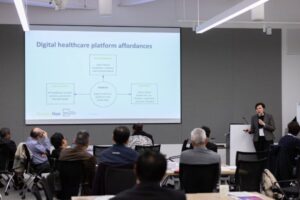Digital technologies (such as “Open AI,” “ChatGPT,” “6G”) open up a multitude of new possibilities for each field: faster access to information, knowledge organization, improved interpersonal communication, etc. However, digital transformation does not occur uniformly worldwide. The main reason for this is the existing imbalance known as the digital divide.
 The topic of the digital divide was one of the main themes discussed at the “Berkeley Innovation Forum” (BIF), organized by the Haas School of Business at the University of California in April 2023, attended by researchers from the Faculty of Economics and Business at Kaunas University of Technology (KTU) who are involved in the implementation of the “In4Act” project.
The topic of the digital divide was one of the main themes discussed at the “Berkeley Innovation Forum” (BIF), organized by the Haas School of Business at the University of California in April 2023, attended by researchers from the Faculty of Economics and Business at Kaunas University of Technology (KTU) who are involved in the implementation of the “In4Act” project.
The forum was attended by Patricia Scotland, the Secretary-General of the Commonwealth, and featured presentations and discussions led by Professor Henry Chesbrough, the founder of open innovation theory, Professor Solomon Darwin, the director of the Smart Villages project, and representatives from over 30 international digital companies, including Microsoft, Adobe, and Ericsson. Professor Asta Pundzienė from KTU, the director of the Business Digital Transformation Research Center, also delivered a presentation at the Berkeley Innovation Forum.
According to the researchers, the digital divide poses a significant challenge in creating value-based digital healthcare. In her presentation titled “The Paradigm of Open Innovation in Healthcare: Ensuring Long and Quality Life for the Current Generation,” Professor Pundzienė emphasized that due to limited access to internet connectivity and the ability to acquire smart, home-administered medical devices, a large portion of the population cannot take advantage of the benefits provided by digital healthcare services. These benefits include personalized, inclusive, preventive, timely, convenient, and cost-effective healthcare services, which are essential for citizens of both developed and developing countries.
As a result, there is already a disparity in the level of digitization between countries and regions, which creates conditions for increasing the divide in the future.
Lina Dagilienė, a researcher involved in the In4Act project at KTU, who participated in the BIF forum, stated that the rapid development of digital technological innovations can lead to a digital divide between developed and developing countries, regions, cities, and rural areas.
“The digital divide arises from insufficient and unequal access to internet connectivity or devices, which leads to uneven access to knowledge and information. Additionally, there are social and economic disparities among people of different races, income levels, and education, which also affect their ability to use the internet. It is important to distinguish between access to the internet and digital literacy, which enables understanding and utilization of technological innovations for educational, economic, and social purposes,” she said.
 “The digital divide leads to a gap in knowledge and education systems, economic inequality, social and political exclusion. It also encompasses the ability to use technologies. Proficiency in using digital technologies is a necessary skill in the 21st-century job market, and those who lack these skills may be disproportionately affected. Educational institutions that lack the necessary infrastructure or resources cannot provide students with essential digital skills. This results in an increasing gap between the education system and the real needs of the market, which hinders the prospects of learners’ future,” said Mantas Vilkas, a researcher from the “In4Act” project, during the forum.
“The digital divide leads to a gap in knowledge and education systems, economic inequality, social and political exclusion. It also encompasses the ability to use technologies. Proficiency in using digital technologies is a necessary skill in the 21st-century job market, and those who lack these skills may be disproportionately affected. Educational institutions that lack the necessary infrastructure or resources cannot provide students with essential digital skills. This results in an increasing gap between the education system and the real needs of the market, which hinders the prospects of learners’ future,” said Mantas Vilkas, a researcher from the “In4Act” project, during the forum.
According to Vilkas, the digital divide also amplifies economic inequality. Those who lack access to technology and knowledge on how to utilize it lose opportunities related to education, healthcare, the job market, and financial services. This leads to a growing economic disparity.
“In recent times, technology is frequently used for social interaction and accessing information about services, events, and current affairs. Those who lack access to these technologies may experience social isolation, which negatively affects their perceived well-being and contributes to societal polarization,” stated Vilkas.
According to Asta Pundzienė, the digital divide also restricts the innovation of technological businesses. For example, medical technologies are increasingly operating based on digital health platforms.
“The secret to the success of digital health platforms lies in the inclusive involvement of various stakeholders (network effect), the ability to collaborate with complementary businesses, unified technological standards, and multilateral socio-economic return mechanisms. If citizens, patients, or doctors cannot access digital health services due to limited access to digital technologies, platform-based businesses will not attract a sufficient number of users and will lose growth opportunities. In other words, businesses will lose interest in developing digital health innovations, while citizens will continue to wait in queues to see doctors and accumulate paper records,” said the professor during her presentation.
Furthermore, according to researchers from KTU, the digital divide contributes to inequalities within the political system. Limited access to information and participation in the political process affects those who lack internet access or cannot use digital technologies. This results in uneven citizen engagement in political processes and diminishes the legitimacy of governance.
 Government and IT companies play a pivotal role in reducing the digital divide as they are the sources of political decisions and technological innovations.
Government and IT companies play a pivotal role in reducing the digital divide as they are the sources of political decisions and technological innovations.
In order to reduce the digital divide, governments must ensure the development of digital infrastructure, subsidize low-income population groups to acquire digital skills, and ensure adequate funding and effectiveness of the education system.
“First and foremost, states need to invest in the development of internet infrastructure, especially in remote and less affluent regions, to ensure broadband access nationwide. Additionally, it is necessary to provide financial support to low-income families so that they can acquire basic digital devices and internet access services. Finally, the public education system needs to integrate the teaching of digital skills into school and adult education programs, which would help adults acquire digital technology skills,” shared L. Dagilienė during the “BIF” forum.
On the other hand, overcoming the digital divide is not possible without the efforts of the business sector. Digital technology companies can contribute to reducing the divide by creating technologies that are tailored to specific situations or populations. For example, developing technologies that can be used in regions with limited internet access.
“Another problem is the high cost of software and electronic devices, which becomes an insurmountable barrier for low-income families. Technology companies can create and distribute more affordable software with limited functionality or simple electronic devices. Similar issues exist in educational and healthcare institutions, which often cannot acquire the necessary software due to limited resources and the need to frequently update it,” said the researcher from KTU.
According to the academics, supporting licensed software for the education sector is an excellent solution to this problem. “Finally, the pace of digital innovation has been very high recently. Educational systems face challenges in adapting to such speed,” said L. Dagilienė.
IT companies address this issue by creating internet-accessible training programs. These programs provide the opportunity to acquire the latest software skills. Moreover, they create communities that are inclined to use these companies’ digital solutions in the job market because they already have knowledge of their use.
According to A. Pundzienė, a professor at KTU, in socially oriented sectors such as education, healthcare, and public governance, the government plays a significant role in reducing the digital divide and motivating the public and private sectors to create digital innovations.
“Digital healthcare platforms are an innovation that can fundamentally change healthcare routines by actively involving citizens and patients, increasing their motivation to take care of their health, while saving time and resources when receiving services remotely. On the other hand, by appropriately regulating, compensating, and organizing digital healthcare services, the healthcare systems of Lithuania and other countries can be significantly improved, as they will face increasing burdens due to an aging population. Failure to implement advanced digital technologies in a timely manner can make this burden unbearable,” said the KTU professor.
Digital technologies, along with rapidly advancing artificial intelligence algorithms, promise to once again change the world. According to the Secretary-General of the United Kingdom, P. Scotland, reducing the digital divide is an essential lever for creating a sustainable future. The World Economic Forum estimates that one-third of the world’s population, around 2.9 billion people, is affected by the digital divide.
At the “BIF” forum, representatives from KTU, along with representatives from other leading universities and businesses, discussed other relevant digitization topics. These included the opportunities presented by artificial intelligence and digital transformation, the significance of open innovation for different business sectors, an overview of revolutionary projects such as “Taara-X” and “X Moonshot,” and many other important messages in the context of digitization.
Researchers from the KTU School of Economics and Business implemented the “In4Act” project funded by the European Union’s Horizon 2020 project at the “BIF” forum. Learn more about “In4Act” at: https://in4act.ktu.edu/